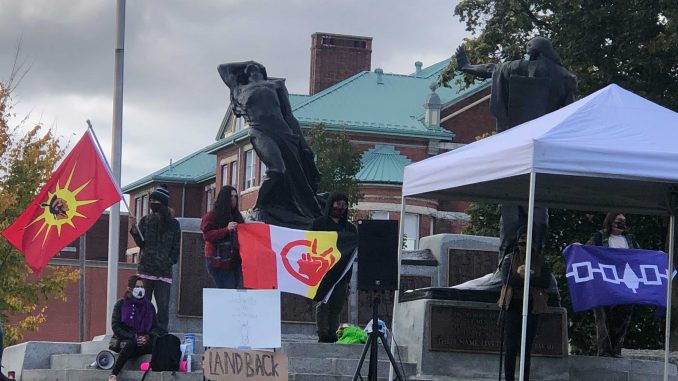
Community members from Peterborough/Nogojiwanong gathered, while social distancing, at Confederation Square in solidarity with the Mi’kmaw lobster fishery on Saturday, October 24. The Indigenous lobster harvest and the subsequent controversy in Nova Scotia have caught the attention of the Nation and sparked solidarity events across the country.
In the southern districts of Nova Scotia, lobster season opens the last Monday of November and runs till the last day of May. These dates are regulated by the Department of Fisheries and Oceans (DFO) to protect lobster moulting. This is the annual process where lobsters shed their exoskeleton and mate during the summer months. Commercial fishers do not harvest during the moult because the lobster’s shells are underdeveloped and too vulnerable to transport. Currently the parameters of the lobster season are primarily determined by the quality of the product, not concerns around conservation.
On September 17, 2020, Sipekne’katik First Nation developed a “moderate livelihood fishery” in Saulierville, Nova Scotia. The Mi’kmaw people have the right to harvest outside of the DFO’s season. In 1999, Mi’kmaw man, Donald Marshal, won his appeal to the Supreme Court of Canada after being arrested for fishing and selling eels without a license. The Court referenced the 1760-1761 Peace and Friendship Treaties that are enshrined in Section 35 of the 1982 Constitution Act. The treaties state that Mi’kmaw people have the right to “earn a moderate livelihood” through trade. This implies that there is an ambiguous limit to the quantity of lobsters that Mi’kmaw people can harvest. The terminology “moderate livelihood” has become contentious as the Federal Government minces words and abstains from negotiating a clear definition with Mi’kmaw fishers.
The Mi’kmaw fishery is operating on a small and sustainable scale. They have set approximately 550 traps which is negligible compared to commercial lobster operations which have approximately 900,000 traps set in southern Nova Scotia. Nonetheless, this legal and responsible operation has provoked an onslaught of violence and intimidation through communities in Nova Scotia. In late September Indigenous fishers endured damage to their lobster traps and racist slurs. The hostility flared into violence on October the thirteenth when a mob of 200 “non-natives” raided the Mi’kmaw lobster pound in Middle West Pubnico and Weymouth. A Mi’kmaw fisher’s van was torched and hundreds of lobsters were killed on the pavement so that they were unsuitable for sale. Mi’kmaw fisher Jason Marr was barricaded in the lobster pound as the mob threw rocks and damaged the commercial building. No arrests have been made. The position of Mi’kmaw fishers has been exacerbated by the RCMP’s apathy.

Given this context, on Saturday October 24, community members from Nogojiwanong gathered in the cold to show solidarity with Mi’kmaw people. The event was educational and gave people the opportunity to share songs, dance and discuss local sovereignty.
Kelli Marshall, or Sky Walker, from the Mississauga territory of Hiawatha First Nations, representing the Pike Clan, shared an Objibway jingle dress dance and a few thoughts.
Kelli Marshall:
It is a healing dance. It holds a special place in my heart. There is healing in that dress… When I was dancing I thought of our brothers and sisters in Nova Scotia and the fear that they must have felt when they were trapped in that building… The constitution and the people that are supposed to protect them, stand by and do nothing. They are complacent and they let it happen. That’s why we’re here today. That’s why we are standing in solidarity… We are standing together for them. I believe in that dress and I believe in our people… One day we will have our sovereignty and we won’t have to fear for our livelihood. Their ancestors have been fishing those waters for generations… Fear brings out ugliness in good people and that’s what’s happening right now… We have to educate ourselves and educate other people so that they stand up because we are not going to overcome this until we all stand together. We have to do it in a loving and good way. That’s our teaching.
There were parallels drawn between the assault against Mi’kmaw fishers, Algonquin moose protectors, Wet’suwet’en land defenders and Anishinaabeg Manoomin (wild rice) harvesters. Across Turtle Island Indigenous sovereignty is threatened. At this unique moment, the pandemic has weakened traditionalism therefore anti-colonial movements have potential to make unprecedented headway. Community organizer, Sam Mae, put it like this:
An attack on Mi’kmaw treaty rights was met with complicity by the Canadian government. In itself, this is a threat to Indigenous Nations across Canada whose rights are entrenched in treaty law. An attack on one community may seem like a local issue but it is inherently tied to the historical and ongoing oppression of Indigenous peoples in Canada overall.
Community organizers say that:
“People can write, call, email, raise funds, talk to their friends and families, and share the events in Nova Scotia on social media. Let people hear about what you think, have these tough conversations acknowledging the fact that inherent and treaty rights are being violated.”
